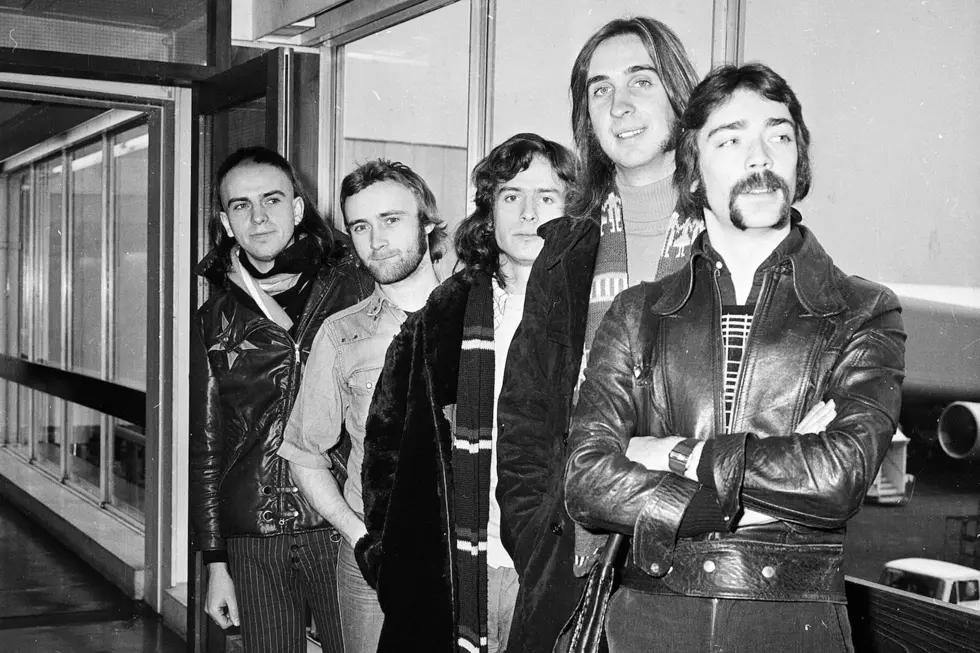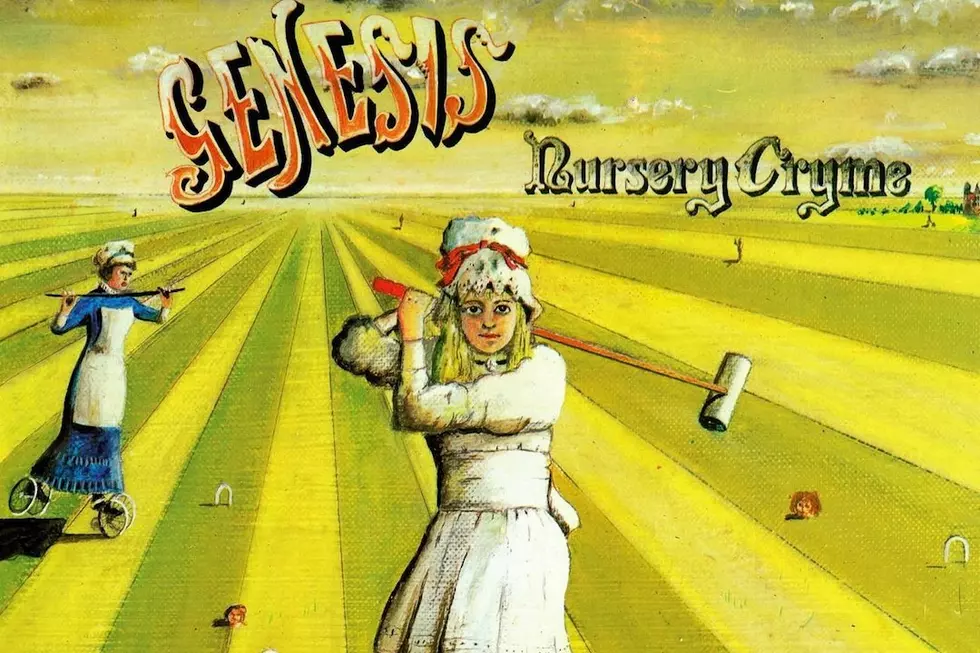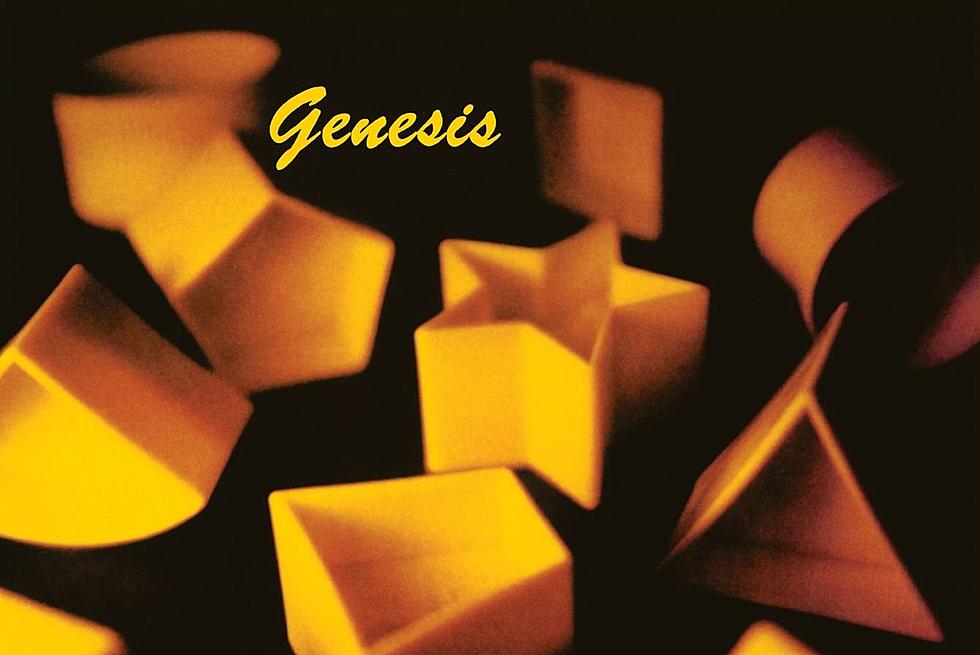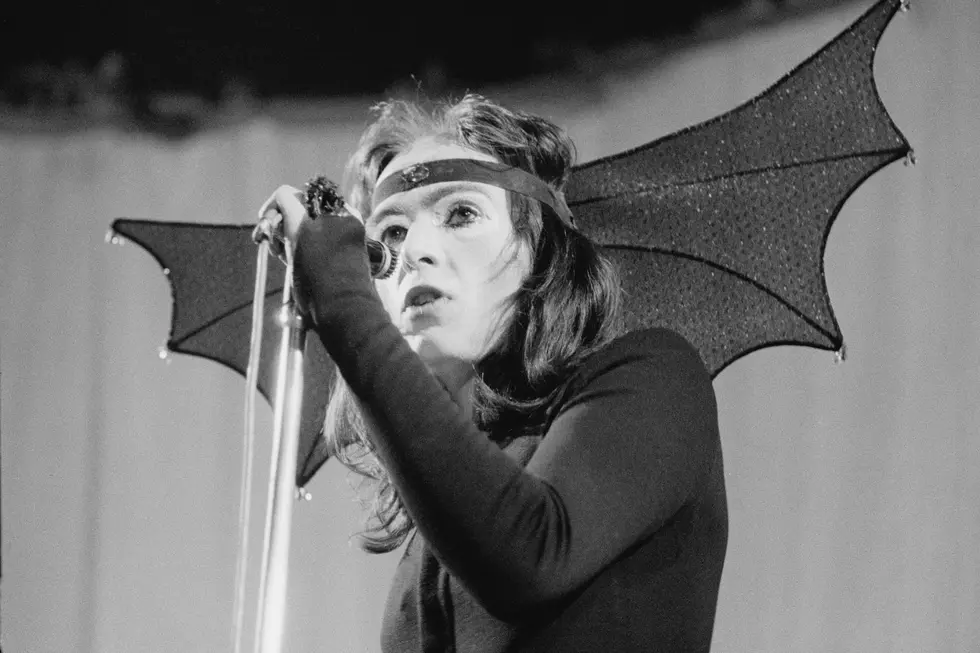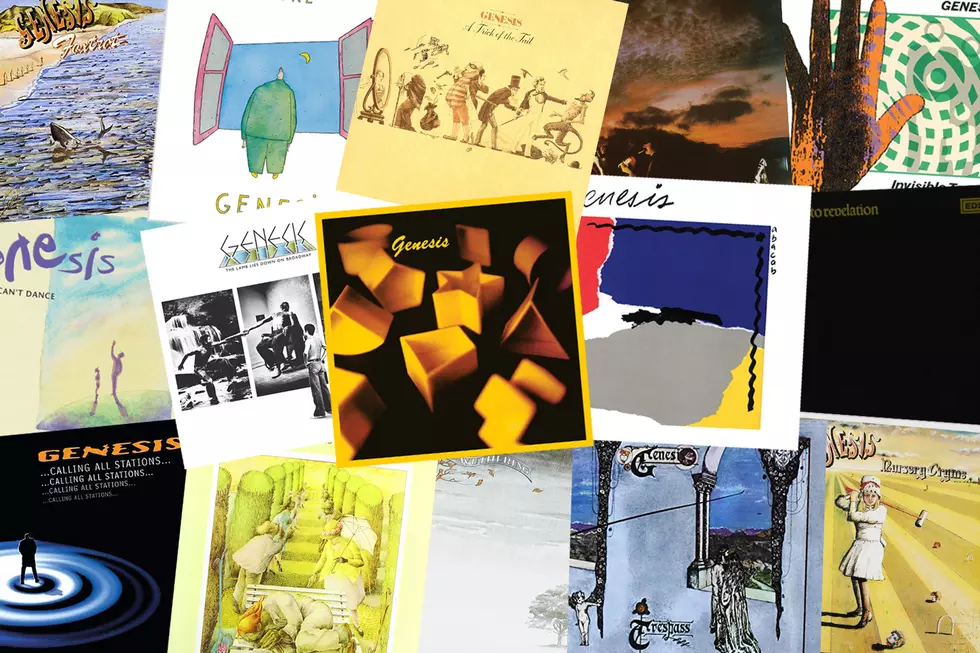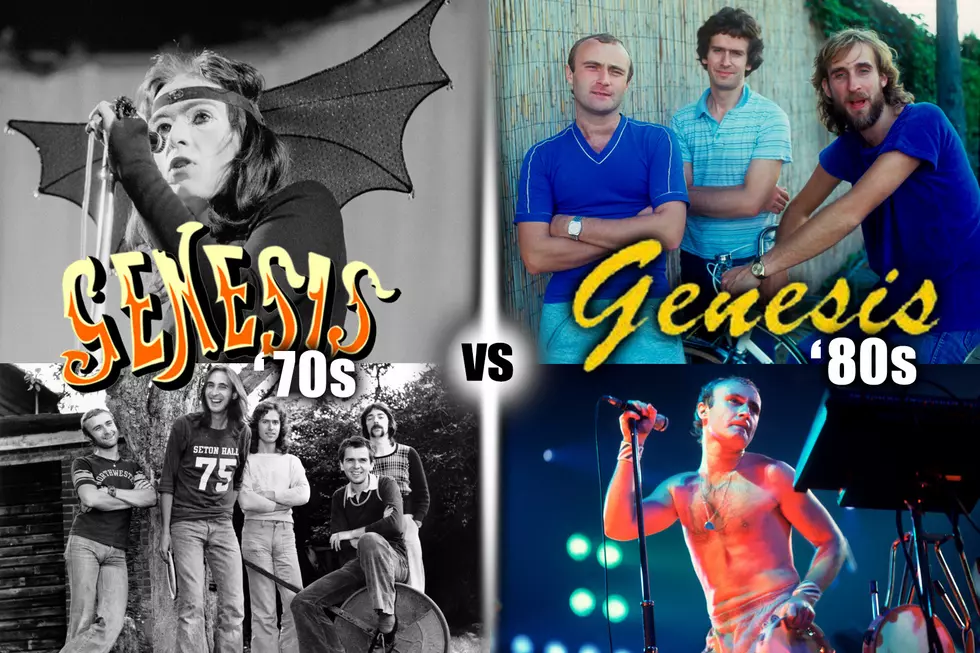
Were Genesis Better in the ’70s or ’80s? Roundtable
Here's the conventional narrative: Genesis were a prog-rock band in the '70s and a pop act in the '80s.
Not quite true. Accessible songs like "I Know What I Like (In Your Wardrobe)" and "More Fool Me" showcased their hook-writing skills long before Peter Gabriel retired his bat-wing costume. And Genesis weren't commercial sell-outs during Phil Collins' era as frontman — let's not forget the elaborately crafted "Domino" or brooding "Mama."
But that's the crux of the '70s-'80s debate: Prog fans who fell in love with "Supper's Ready" often shun the shorter, catchier material, and pop fans riveted by "Invisible Touch" may snooze during a 25-minute epic.
So who's right? Four of our writers weighed in on this endless debate.
1. Were Genesis better in the '70s or '80s?
Ryan Reed: The '80s don't stand a chance here — partly because the '70s have a much bigger resume. The stretch from Trespass to Wind & Wuthering is the most consistent, quality-wise, in prog history. And they covered so much ground during that period, evolving from pastoral 12-string folk sounds to knotty, symphonic epics to arena-friendly rock. That's a tough act to follow. The '80s material, with its streamlined arrangements and lyrics, can't compete with that scope. Plus, Genesis released only four albums in that decade. The math wins.
Michael Gallucci: They were a more exciting and original band in the '70s. Their best albums — from Foxtrot through A Trick of the Tail — were recorded then too. Plus, they actually seemed like a band, rather than a vehicle for Phil Collins, who pretty much stamped his identity all over the '80s material as the decade progressed.
Corey Irwin: Give me ‘80s Genesis. I know the earlier version was more experimental and highbrow, but I like catchy tunes that get people moving, and the band had plenty of them in the Reagan years.
Nick DeRiso: They started better than they finished both times, but the best of the ‘70s era were legend-making records. It’s really not close. On the other hand, Genesis’ next-decade successes on their 1983 self-titled album and (in particular) 1981’s Abacab represented flinty new sounds that actually opened the door for all of the excesses that followed. Even the good stuff feels like that moment when Wile E. Coyote has already run himself off the cliff — but hasn’t realized yet how far down he’s about to plunge.
2. What are the best and worst Genesis albums of each decade?
Reed: For the '70s, it's Selling England by the Pound (best) and … And Then There Were Three … (worst). Selling England has everything I love about Genesis in pure prog mode: whimsical arrangements ("The Cinema Show"), dynamic performances ("Dancing With the Moonlit Knight"), tightly composed solos ("Firth of Fifth") and the overlooked playfulness ("I Know What I Like [In Your Wardrobe]") that defines so much of the '70s. I'll vouch for … And Then There Were Three … any day of the week, but there are too many wispy moments ("Say It's Alright Joe," "Many Too Many") to keep it in my constant rotation. For the '80s, I'm going with Duke (best) and Genesis (worst). The former is their most natural balance of prog and pop; the latter dips in quality a bit after the massive one-two punch of "Mama" and "That's All."
Gallucci: '70s Best: The Lamb Lies Down on Broadway. '70s Worst: Trespass. '80s Best: Duke. '80s Worst: Invisible Touch. If you map out my favorite and least-favorite Genesis albums, they pretty much form a bell shape. The earliest albums — like 1970's Trespass — are sketchy before the band finally reached a peak with 1974's The Lamb Lies Down on Broadway. Following Peter Gabriel's departure after that album, there's a slow decline through the next couple decades. They started the '80s with the proggy, solid Duke and ended it with the poppy, soggy Invisible Touch.
Irwin: For the ‘70s, Selling England by the Pound is best. The new jazz influences infused extra layers to the band’s sound, while the lyrical content focused on English culture. The tunes were smart and varied, but still accessible — a finely crafted prog-rock opus from front to back. Worst of the era is ... And Then There Were Three ... , which was undoubtedly hindered by the departure of Steve Hackett. There are a couple of good tracks on the LP, but overall it lacks direction. From the ‘80s, Invisible Touch is the best. It’s full of undeniably catchy earworms - from the title track (which hit No. 1) to the ballad “Throwing it All Away” to the sprawling “Tonight, Tonight, Tonight.” Abacab is the worst of the ‘80s, simply because it’s an overall boring effort.
DeRiso: Selling England by the Pound isn’t just the best Genesis album of the ‘70s, it’s their best album, period. This is the too-often-overlooked culmination of the five-man edition of Genesis, rather than Gabriel's overstuffed Lamb Lies Down on Broadway finale, as Genesis deftly combine the flights of fancy that lifted 1971’s Nursery Cryme with the more determined edge of 1972’s Foxtrot. Worst of the '70s: The transitional ... And Then There Were Three ... . For the '80s, Abacab represented a bold update of the Genesis sound, as they dove into new synth tech. They finally found their new trio voice too. Before, Genesis tended to offer esoteric material (occasionally with too many words or too much music ... or both). For better or worse, Abacab blew that to bits. Worst of the '80s: Invisible Touch, as Mike Rutherford and Tony Banks seem to be relegated to programmable sidemen.
3. Who's the better Genesis singer: Phil Collins or Peter Gabriel?
Reed: On a purely technical level, it's Collins. He was a more versatile singer, with a more controlled vibrato and (by the '80s) an unrivaled level of grittiness and intensity when the moment struck ("Mama"). On an emotional level, I lean — just slightly — toward Gabriel, my all-time favorite singer. His voice was still raw in the '70s, far from the precision he'd achieve as a solo artist. But no other singer consistently gives me the chills, like with his tour de force on the 25-minute "Supper's Ready."
Gallucci: I think each singer best represented the band's two distinct eras. Gabriel's more mechanical tone was more suited for the early prog material, while Collins' warmer voice fit Genesis' later pop songs. Still, both could appropriate themselves credibly to the others' genre — see Collins on 1976's prog-leaning A Trick of the Tail, the band's best album without Gabriel, and Gabriel's 1986 LP, So, a great record that made him a pop star. If you're forcing me to choose, I'll say Gabriel — if only because I prefer his records with Genesis as well as his solo albums to Collins'.
Irwin: Gabriel is the better overall artist, but I actually believe his strongest work has come outside of the Genesis confines. So, somewhat by default, I’m giving the edge to Collins, whose pitch-perfect vocals were ideal for the band’s later pop-centric sound.
DeRiso: If we focus strictly on Gabriel’s time with Genesis, and not on his much more nuanced solo work, the rangy Collins was clearly superior. Not until "The Carpet Crawlers,” the most approachable song on Gabriel’s last album with Genesis, do we get a hint at what’s to come: As Genesis put aside much of The Big Concept for a moment of gorgeous rumination, the track's billowing vocal layers provided some of the first true hints at the darker, less-reedy sound that Gabriel explored after he left.
4. Collins took over after Gabriel's departure, and bassist Mike Rutherford also took on electric guitar duties after Steve Hackett left the group in 1977. Should Genesis have hired other musicians as replacements?
Reed: It's tempting to play this game, but I'm not sure Genesis could have pulled off that move without creating more drama and awkwardness than they could handle. Collins, Rutherford and Banks had pure chemistry as bandmates — the perfect balance of humor and intensity to make the whole thing work. There was no reason to find a replacement drummer since Collins is among the greatest to ever play. A new guitarist could have been intriguing, but Rutherford handled his dual role with class — after all, they didn't need a technical wizard like Hackett to handle their simpler, sleeker songs. They took the exact right path: recruiting Daryl Stuermer and Chester Thompson as their regular live members, sticking to the trio format in the studio.
Gallucci: They did on tour, which helped flesh out the sound the trio achieved in the studio with overdubs and tracking. And really there wasn't much difference between what you heard on record in 1983 and what you saw onstage at the time. So I'm totally fine with the core trio lineup. Why mess that up with new names?
Irwin: It’s hard to say without knowing who those musicians would have been. Perhaps a different singer and/or guitarist would have steered the group further down the prog-rock rabbit hole, leading to an era full of 15-minute songs but absent of the kind of radio-friendly commercial hits that lifted the band to commercial heights in the ‘80s. Evolving with Collins and Rutherford was the right call, and I think history backs up my stance.
DeRiso: Hackett was sorely, sorely missed. But then again, Banks’ instrument moved to the fore in some very interesting ways — at least initially. Check out the keyboard-driven “Deep in the Motherlode” from 1978’s ... And Then There Were Three ... or (more crucially) the title track of 1981’s Abacab, a canny melding of New Wave sounds. In that moment, he tapped the zeitgeist. Unfortunately, we know now that Banks would soon be reduced to pastel pullovers and MTV-ready synth stabs.
5. Despite being viewed as a prog band that went pop, Genesis actually had some simple verse-chorus songs in the '70s and some lengthy, complex pieces in the '80s. Do you have a favorite song from either camp?
Reed: My favorite pop song from the prog era is the gently psychedelic "I Know What I Like (In Your Wardrobe)," their first U.K. hit. (Runners up: "Counting Out Time," B-side "Happy the Man.") My favorite prog song from the pop era is the 10-minute marvel "Domino," with the jagged "Me and Sarah Jane" following close behind.
Gallucci: Even though it's about a guy and his lawnmower (I think), there's a reason 1973's "I Know What I Like (In Your Wardrobe)" became the band's first charting single: It's a great pop song. And while Genesis continued to lay out some long prog epics during the period when they made their pop transition, my favorite from this era is 1983's "Mama." Yes, it was a popular single and an MTV hit. But it runs seven minutes, contains a totally demonic laugh and is about some dude's obsession with a prostitute. Not exactly standard pop fare at a time when "Flashdance ... What a Feeling" was all over the radio.
Irwin: Staying consistent here, I’ll take the ‘80s complex songs. The aforementioned “Tonight, Tonight, Tonight” still had plenty of prog-rock twists and turns, including an extended instrumental part midway through the track. The epic 1983 single “Mama,” with its powerful vocals and emphatic drum machine, was another of that era’s better tunes.
DeRiso: “Ripples" is the moment when Phil Collins started to become Phil Collins, illustrating how Genesis began shedding their prog pretensions all the way back in 1976. This track walks a very fine line, as Collins’ soon-to-be-familiar ballad-vocal, sad then soaring, sits atop a still complex musical track built off a 12-string guitar piece from Rutherford. (Banks gets a piano-driven middle section too.) Of the longer, ‘80s-era songs, I’ve always been partial to “Home by the Sea/Second Home by the Sea.” Crunchy and limber, then spacey and a bit progressive — and with a spooky theme to boot — this 11-plus-minute pairing was the best of the increasingly rare looks back to Genesis’ earlier long-form approach.
6. Are the '80s albums overproduced and underdeveloped, or does their pop shift feel natural and creatively satisfying?
Reed: They're slick — no doubt about that. But the production was stylish for its time and, more importantly, fit the brightness of the material. Genesis and Invisible Touch do feel inextricably linked to their era, but the songs are (mostly) strong enough to overcome the "period piece" label. Their evolution is both satisfying and a bit shocking, especially when you listen to the catalog chronologically. A lot can happen in a couple decades.
Gallucci: I think the bridge was laid earlier, on 1978's ... And Then There Were Three ... after Steve Hackett left the band. It was only a matter of time before they got to Abacab, Genesis and, finally, Invisible Touch. And let's face it: Genesis did it more effortlessly and effectively than most of their prog — or rock, for that matter — contemporaries. They evolved with the times.
Irwin: I believe Genesis’ evolution to pop wasn’t just natural — it was necessary. If a band wants to reach the upper echelon of acts, they need to make material both artistically relevant and digestible by the mainstream audience. Genesis didn’t completely abandon the formula of their early years, they just altered it to help their fan base further grow. It also led to some of the best work of the band’s career; “That’s All” remains one of my favorite songs of the decade. As for the overproduction, it was the ‘80s! That’s just how things were done.
DeRiso: My issue, then as now, was how unneeded the biggest Collins-sung hits (“Invisible Touch,” “Hold On My Heart”) always were on the later-era Genesis albums. As a burgeoning solo career made Collins utterly omnipresent, the replication of similar-sounding songs made weary work of figuring out which was which. If you listened to the radio, his solo and band songs were virtually indistinguishable. Unfortunately, that made the albums, even though they often had better deep cuts, come off like cash-grabs since Collins already had a well-established solo outlet for soft-rock balladry and overproduced, mechanical pop.
Genesis Solo Albums Ranked
More From Ultimate Classic Rock
